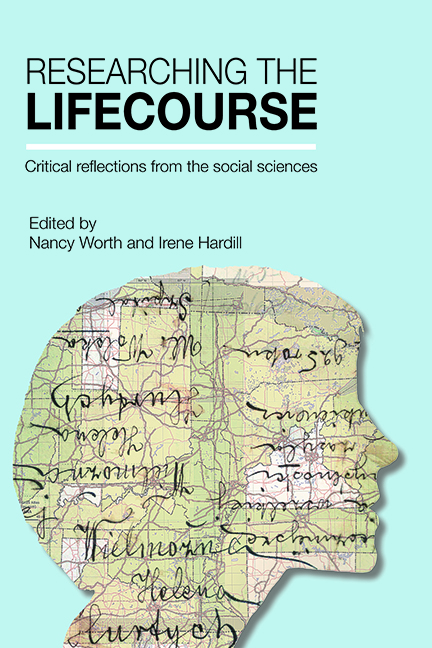nine - Triangulation with softGIS in lifecourse research: situated action possibilities and embodied knowledge
Published online by Cambridge University Press: 08 March 2022
Summary
Introduction
In this chapter I focus on the possibilities that embodied knowledge opens up when undertaking research on the lifecourse. Shotter (2009) argues that social theorists often overlook embodied knowledge as they evaluate human action through causes (emphasising structures) or reasons (emphasising agency). In my work on ‘geobiographies’ I connect the highly contextual and unique with lifecourse information, specifically relating current everyday life (especially outdoor activities) with the habitualities developed over a participant’s lifecourse. I examine embodied knowledge as a joint outcome of the lifecourse and its geographical context – space and place. In this chapter I use geocoordinates as a contextual tool and to underline that the conditions of action are also shaped by the material world, the ‘geo-’ of the geobiographies. I provide indicative examples of lifestories, ‘softGIS’- data (derived from a PPGIS application thematising experience-based data of everyday environments) and walking interviews. I draw some data from a larger project that used softGIS to study the ways the citizens used their urban environments for different outdoor activities. I aim to uncover the self-evident that seems to escape when we verbalise our experiences but which may be grasped by going back and forth from the respondent to his/her past and present everyday environments, both memorised and reactualised.
After this brief introduction, the next section focuses on the promise of ‘geobiography’ as a concept, the third section on preparedness to act. In the fourth and fifth sections I show how I triangulate between methods and data sources, and in the final section I open up a pilot case, which is followed by discussion, and a conclusion. In comparison with many studies I move between a single case and a larger dataset somewhat unconventionally, to gain an appreciation of the intricacy of the phenomena under scrutiny.
The promise of ‘geo’biographies
Pauli Tapani Karjalainen (2003, p 87) has been interested in the triad of place, memory and self, and has developed the concept of geobiography: ‘the expression of the course of life as it relates to the places lived’. For Karjalainen, the focus is on how meaningful episodes are spatially constituted. Carpelan’s novel Urwind is for him an example of creative literature that shows ‘how intimate sensing works out in the many layers of place realities’ (Karjalainen, 1999, p 1).
- Type
- Chapter
- Information
- Researching the LifecourseCritical Reflections from the Social Sciences, pp. 161 - 180Publisher: Bristol University PressPrint publication year: 2015

